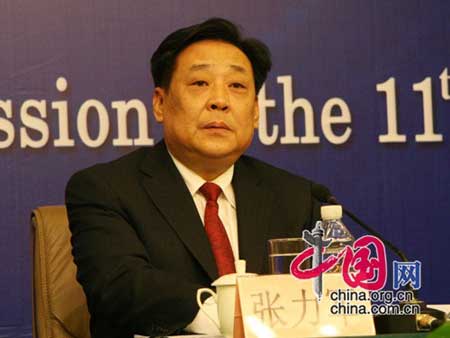By Yuan Fang
China.org.cn staff reporter
Faced with the global financial crisis, the Chinese government announced a slew of measures to stimulate domestic demand. Among them were moves to boost auto sales.
In January the State Council unveiled a stimulus plan to support the auto industry. One of the key points was a temporary cut in purchase tax on cars under 1.6 liters, from 10 percent to 5 percent. The tax cut will run from Jan. 20 to Dec. 31, 2009.
While in line with the government's macroeconomic goals to combat the economic downturn, the measure has triggered concern that increased auto sales will damage the environment.
|

|
|
Zhang Lijun, vice minister of environmental protection. |
In the first two months of this year, sales of passenger cars in the under 1.6 liter class rose 18.78 percent year on year to reach 859,300 units, according to the Chinese Auto Industry Association.
But in response to environmental concerns, Zhang Lijun, vice minister of environmental protection, said policies are in place to minimize the impact of increased car sales.
"There's no doubt that increased sales will exert pressure on the environment, but we can't stop selling cars because of this. Cars are a modern means of transportation and are essential for convenience and business," Zhang told reporters Wednesday on the sidelines of the annual session of the National People's Congress.
He said his ministry will impose the China III emissions standard, equivalent to the Euro III standard, on newly-manufactured motor vehicles.
"China has imposed the China III emissions standard nationwide," said Zhang. "We will conduct random sample checks on the assembly lines of automakers to ensure newly-manufactured vehicles meet the standard."
According to Zhang, big cities in China including Beijing, Shanghai and Guangdong have already imposed or are planning to impose the China IV (Euro IV) emissions standard.
The ministry is also accelerating the scrapping of "Huangbiaoche", vehicles with yellow environmental protection labels. These are gasoline-fueled vehicles that fail to meet the China I emissions standard or diesel-fueled vehicles that fail to meet the China III emissions standard.
"We will combine administrative, economic and legal means in the scrapping of these cars," said Zhang.
He said the government has set aside a special fund for the scrapping of high-emissions vehicles.
Beijing has allocated 1 billion yuan so far to compensate those who can prove their "Huangbiaoche" has either been scrapped or transferred out of Beijing.
If 80 percent of high-emissions vehicles were taken off the road, air pollution in the city would be reduced by 300,000 tons to 400,000 tons a year, an official with Beijing Municipal Environmental Protection Bureau said earlier.
(China.org.cn March 11, 2009)